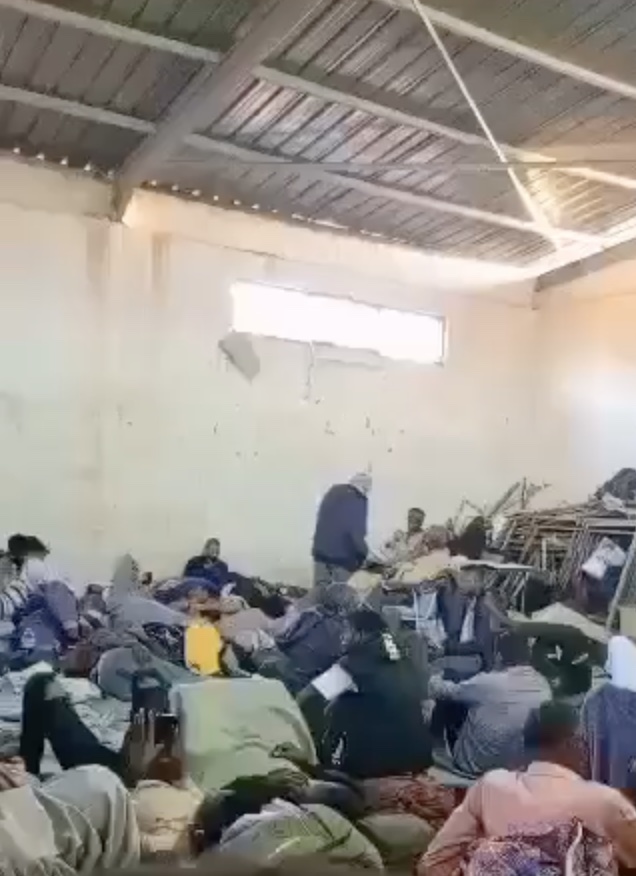
There are increasing calls for Egypt to stop its summary detention and deportation of Sudanese who are fleeing the escalating crisis in their country, as well as growing pressure on the European Union to take steps to prevent its aid to the country from being used to violate the rights of refugees.
The conflict in Sudan and Egypt’s response
The Global Detention Project (GDP) and the Committee for Justice (CFJ) recently released an urgent appeal concerning the escalating humanitarian crisis affecting Sudanese refugees detained in Egypt. The report points to Egypt’s alarming response along its southern border as the humanitarian crisis in Sudan has intensified, in violation of its human rights commitments. As the number of Sudanese refugees crossing into Egypt has grown, Egyptian authorities have ramped up arrests, arbitrary detentions, pushbacks and refoulements, breaching Egypt’s obligations under international refugee law.
Since the conflict erupted between the Sudanese Armed Forces (SAF) and the paramilitary Rapid Support Forces (RSF) in early 2023, more than 460,000 Sudanese refugees have reached Egypt, joining another 4 million compatriots already displaced there. However, Egyptian authorities refuse to set up refugee camps in border areas and the processing time for entry permits is extremely slow, forcing refugees to live in dire conditions for extended periods. Due to heightening restrictions that make entering and residing in Egypt increasingly difficult, thousands of Sudanese–including women, children, elderly, and people in serious need of medical attention–are living at the frontiers without shelters or toilets, overcrowded, with insufficient supplies of food and water, and lacking services. The Egyptian authorities have been urged to facilitate visa procedures for those with medical needs since deaths among those waiting for treatments are increasing.
One month into the conflict in Sudan, UNHCR called on “all countries to allow civilians of all nationalities fleeing Sudan non-discriminatory access to their territories” and to suspend the forcible return of Sudanese claiming asylum, including those whose claims had already been rejected. Nonetheless, Egypt suspended visa-free entry for women, people aged under 16 years old, and men over 60, while waiting periods to obtain Egyptian visas from consulates in Sudan range from two to five months. The combination of these circumstances forced more people escaping the war in Sudan to cross borders with Egypt irregularly, facing even further risks and, in some cases, separating families. The GDP observed that registered refugees and asylum seekers in Sudan have no legal pathway to enter Egypt, leaving them only the equally dangerous options of irregular movement or remaining in Sudan.
Increasing arbitrary detentions and refoulement in Egypt’s border areas
Reportedly, during 2023 there was a 42 percent increase in detentions in Egypt’s border areas, such as Awsan, which has become a highly securitised city where people–mainly Sudanese–face risks of arrests even simply for being in the area. Even more worrying, UNHCR and other humanitarian organisations are denied access to all detention facilities in Egypt, making it increasingly difficult to monitor detentions and deportations.
The UN Human Rights Committee has raised concerns about “the absence of an adequate legislative and institutional framework ensuring the right to asylum and protection against refoulement for all asylum seekers entering the county.” Furthermore, the statement continues, reports confirmed that people in need of humanitarian protection have been apprehended at the border, detained for entering the country irregularly, denied their rights to access asylum procedures and have their protection claims examined, and forcibly repatriated, in violation of the principle of non-refoulement.
Observers informed that detainees–including women, some of whom pregnant, children, elderly, and sick people–are held in camps not legally registered as detention centres in appalling conditions, where they are not allowed any type of visit and are denied access to UNHCR services and legal advice.
A video shared with the GDP was posted on social media by a Sudanese diaspora group, urging the UN and the international community for assistance. It shows detainees confined for 25 days in an Egyptian army-operated prison under overcrowded conditions, without access to medical care, facing shortages of food and water, enduring non-existent sanitary standards and not separated by age or gender.
Reports also allege that in cities such as Cairo, Giza and Alexandria abuses followed “a clear pattern of authorities targeting Black people for arbitrary arrests in raids on residential areas of African nationalities.”
Urging further assistance from the international community
Egypt’s violations of its international obligations, constitution, and human rights principles come at a critical time. The European Union has recently agreed to provide billions of euros in financial assistance to Egypt, in part to support the management of migration flows, which makes Europe potentially accountable for abuses committed against vulnerable refugees and asylum seekers in the country. In a recent speech to the European Commission, Parliamentarian Tineke Strik urged the Commission not to give Egypt “blanco cheques” that may end up being used to harm people fleeing war and persecution.
The GDP and the CFJ appeal calls for ceasing de facto detentions in border regions; ending the detention of children and their families; ensuring that detainees are able to challenge the grounds of their detention and that are provided access to legal aid; removing visa requirements for those fleeing the conflict in Sudan; suspending all deportations to Sudan; guaranteeing access to fair and efficient asylum proceedings for all those claiming asylum in Egyptian territory; suspending the enforcement of penalties on those entering Egypt illegally from a territory where their life or freedom was threatened; granting access to UNHCR and humanitarian organisations to border areas and detention facilities; providing data on immigration detention and deportation to ensure transparency and accountability.


